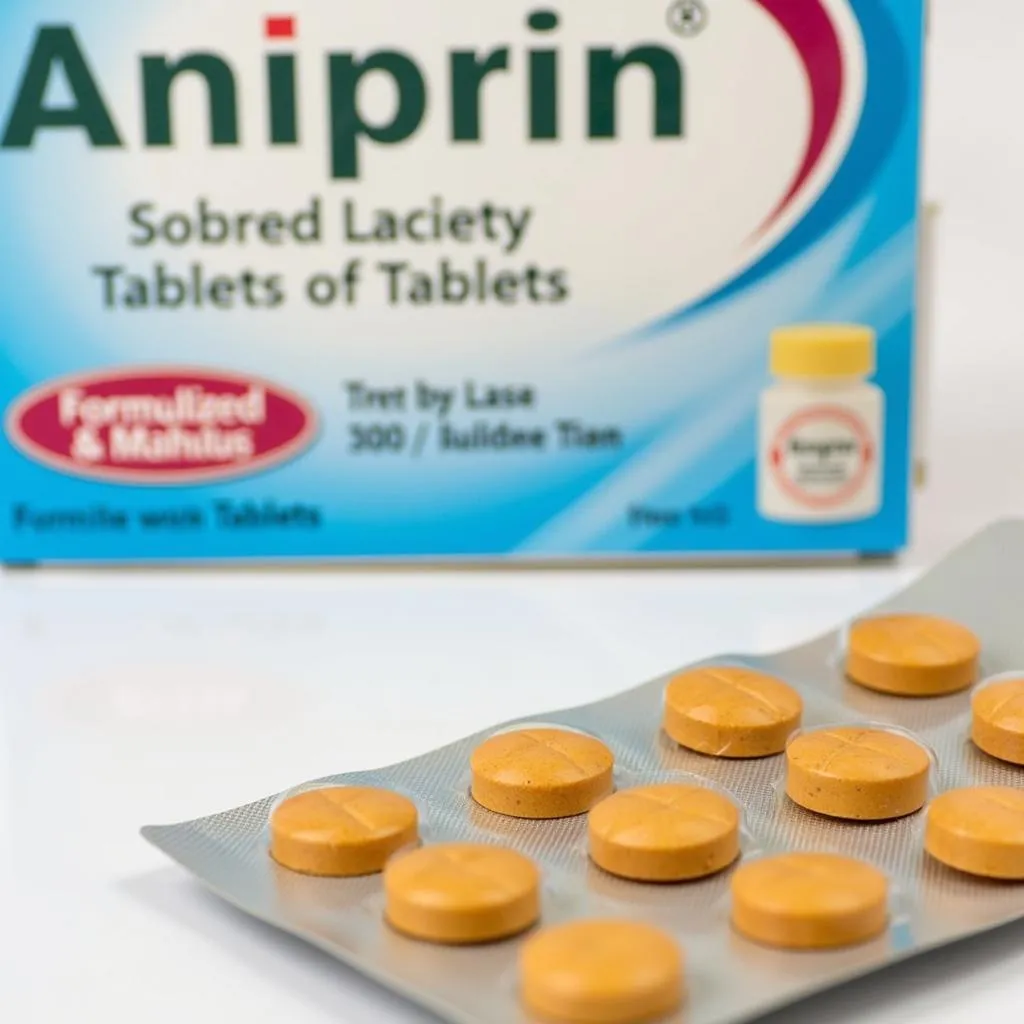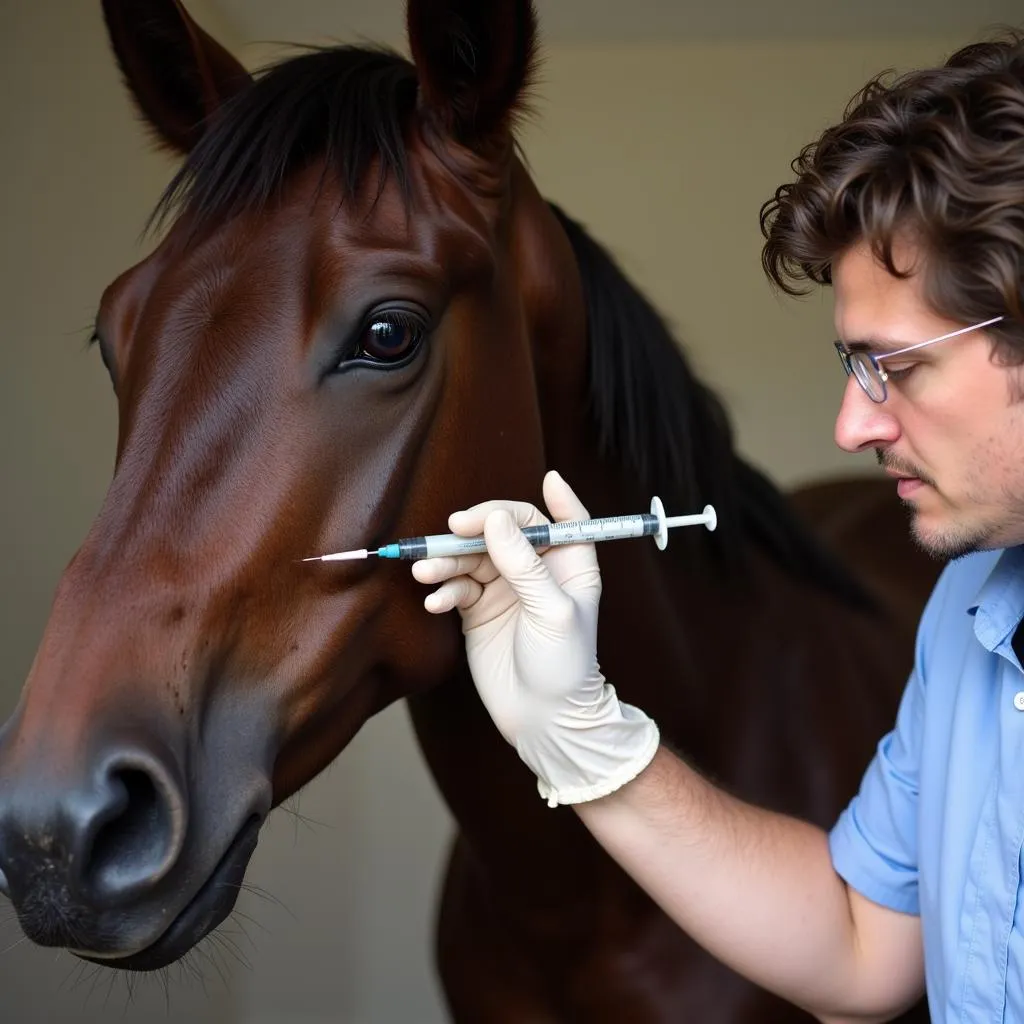Aniprin is a commonly used non-steroidal anti-inflammatory drug (NSAID) for horses, known for its effectiveness in managing pain and inflammation. Whether your equine companion is recovering from strenuous activity, suffering from arthritis, or experiencing discomfort due to other medical conditions, Aniprin might be a suitable option. This comprehensive guide delves into the uses, dosage, side effects, and important considerations for using Aniprin For Horses.
 Aniprin tablets for horses
Aniprin tablets for horses
Understanding Aniprin and Its Uses
Aniprin contains the active ingredient acetylsalicylic acid, commonly known as aspirin. It works by inhibiting the production of prostaglandins, hormone-like substances that contribute to pain, inflammation, and fever.
Aniprin is often the drug of choice for veterinarians treating a variety of equine conditions, including:
- Musculoskeletal pain: Sprains, strains, arthritis, laminitis, navicular disease
- Post-operative pain and inflammation: Following surgical procedures
- Fever reduction: In conjunction with addressing the underlying cause
- Colic pain: As part of a comprehensive treatment plan
Aniprin Dosage for Horses: Consulting Your Veterinarian is Crucial
Determining the correct dosage of Aniprin for your horse is crucial and should always be done by a qualified veterinarian. The dosage can vary greatly depending on several factors, including:
- Weight of the horse: Accurate weight estimation is essential for safe dosing.
- Severity of the condition: Dosage adjustments might be necessary.
- Individual horse sensitivity: Some horses may require dosage adjustments.
- Concurrent medications or health conditions: Interactions can occur.
Never attempt to self-medicate your horse. Overdosing on Aniprin can have serious, even fatal, consequences.
Administering Aniprin to Horses
Aniprin for horses typically comes in either a powder or paste form, making it relatively easy to administer. Here are some general guidelines:
- Powder form: Mix the prescribed amount of powder thoroughly with a palatable feed, ensuring the horse consumes the entire dose.
- Paste form: Using the syringe provided, deposit the paste onto the back of the horse’s tongue, making sure the horse swallows.
Always follow your veterinarian’s instructions carefully regarding dosage and administration.
 Veterinarian administering Aniprin to horse
Veterinarian administering Aniprin to horse
Potential Side Effects and Risks
While Aniprin is generally safe for horses when administered correctly, like any medication, it can potentially cause side effects. These can include:
- Gastrointestinal upset: The most common side effect, manifested as loss of appetite, diarrhea, or colic.
- Gastric ulcers: Prolonged use or high doses can increase the risk.
- Kidney problems: More likely with dehydration or pre-existing kidney issues.
- Allergic reactions: Though rare, reactions such as hives or facial swelling can occur.
If you observe any unusual symptoms or changes in your horse’s behavior after administering Aniprin, contact your veterinarian immediately.
Precautions and Contraindications
- Pregnancy and Lactation: Aniprin’s safety during pregnancy or lactation in mares is not fully established. Consult your veterinarian for guidance.
- Young horses: Use with caution in foals and young horses, as they may be more susceptible to side effects.
- Dehydration or kidney problems: Aniprin can worsen these conditions.
- Concurrent use of other NSAIDs: Avoid combining Aniprin with other NSAIDs like phenylbutazone (“bute”), as this can increase the risk of side effects.
- History of gastric ulcers: Use Aniprin cautiously in horses with a history of ulcers.
 Horse grazing in pasture – Aniprin precautions
Horse grazing in pasture – Aniprin precautions
Aniprin for Horses: Frequently Asked Questions
Can I give my horse Aniprin if it’s already on other medications?
It’s crucial to inform your veterinarian about all medications, supplements, and treatments your horse is currently receiving before administering Aniprin. Some medications can interact with Aniprin, potentially leading to adverse effects.
What should I do if I miss a dose of Aniprin for my horse?
If you miss a dose, administer it as soon as you remember. However, if it’s almost time for the next scheduled dose, skip the missed dose and resume the regular dosing schedule. Do not double-dose to compensate for a missed dose.
Can I purchase Aniprin for my horse over-the-counter?
While Aniprin for human use is readily available, it’s important to only use Aniprin specifically formulated for horses, which typically requires a prescription from your veterinarian.
How long does it take for Aniprin to start working in horses?
The onset of action for Aniprin in horses varies depending on the formulation and the individual horse. Generally, you can expect to see some improvement in pain and inflammation within a few hours of administration.
What is the best way to store Aniprin?
Store Aniprin in a cool, dry place, out of direct sunlight and reach of children and animals. Always refer to the product packaging for specific storage instructions.
Need More Help?
Do you still have questions about Aniprin for horses or other equine health concerns? We’re here to help! Contact our team of experts 24/7:
- Phone: 0772127271
- Email: [email protected]
- Visit us: QGM2+WX2, Vị Trung, Vị Thuỷ, Hậu Giang, Việt Nam
Justus Horses USA is your trusted source for comprehensive and reliable information on equine care.